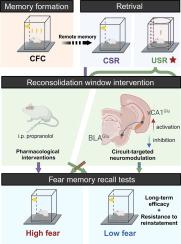A ventral hippocampus-basolateral amygdala circuit regulates the unconditioned stimulus retrieval-induced reconsolidation of remote fear memory
IF 13
1区 综合性期刊
Q1 MULTIDISCIPLINARY SCIENCES
引用次数: 0
Abstract
Introduction
Memory is retrieved and updated during reconsolidation, which provides a potential target for therapeutic intervention. Reconsolidation blockade following unconditioned stimulus (US) retrieval has shown increasing promise in disrupting persistent remote fear memory, yet the underlying neural mechanisms remain poorly understood.Objectives
This study aims to elucidate the neural mechanisms involved in US retrieval-induced reconsolidation of remote fear memory.Methods
We established a rat model of contextual fear conditioning to investigate recent and remote fear memory with reconsolidation induced by US or conditioned stimulus (CS) retrieval. Pharmacological intervention, retrograde tracing, immunofluorescence, fiber photometry, as well as chemogenetic manipulation were employed to identify and manipulate key circuits involved in reconsolidation of fear memory.Results
In this study, we show that pharmacological disruption of the US retrieval-induced reconsolidation of fear memory had a relatively long-lasting effect and was also effective for remote fear memory. We further reveal that activity of ventral hippocampal CA1 (vCA1)–basolateral amygdala (BLA) circuit specially contributes to US retrieval-induced reconsolidation of remote fear memory. Specifically, pharmacological interventions and inhibition of this circuit after US retrieval effectively disrupted remote fear memory, which showed long-term efficacy and resistance to reinstatement. Conversely, activating this circuit blocked the disruptive effect of propranolol on the remote fear memory reconsolidation.Conclusion
Our findings suggest that the vCA1-BLA circuit becomes increasingly important for remote fear memory reconsolidation, particularly induced by US retrieval. This study highlights the potential for targeting specific circuits involved in reconsolidation of remote fear memory for therapeutic interventions in fear-related disorders.

海马体腹侧-基底外侧杏仁核回路调节非条件刺激提取诱导的远端恐惧记忆再巩固
在重新巩固过程中,介绍性记忆被检索和更新,这为治疗干预提供了潜在的目标。非条件刺激(US)检索后的再巩固封锁在破坏持久远程恐惧记忆方面显示出越来越大的希望,但潜在的神经机制仍然知之甚少。目的探讨美国提取诱发远端恐惧记忆再巩固的神经机制。方法建立大鼠情境恐惧条件反射模型,研究美国刺激和条件刺激检索诱发的近期和远程恐惧记忆再巩固。采用药物干预、逆行示踪、免疫荧光、纤维光度法和化学发生操作来识别和操纵涉及恐惧记忆再巩固的关键电路。结果在本研究中,我们发现药物破坏美国提取诱导的恐惧记忆再巩固具有相对持久的效果,并且对远程恐惧记忆也有效。我们进一步发现,腹侧海马CA1 (vCA1) -基底外侧杏仁核(BLA)回路的活动特别有助于美国检索诱导的远程恐惧记忆的再巩固。具体而言,药物干预和US检索后对该回路的抑制有效地破坏了远程恐惧记忆,并显示出长期疗效和恢复阻力。相反,激活这一回路阻断了心得安对远程恐惧记忆再巩固的破坏作用。结论vCA1-BLA回路在远端恐惧记忆再巩固中起着越来越重要的作用,尤其是在US检索诱导下。这项研究强调了在恐惧相关疾病的治疗干预中,针对涉及远程恐惧记忆再巩固的特定回路的潜力。
本文章由计算机程序翻译,如有差异,请以英文原文为准。
求助全文
约1分钟内获得全文
求助全文
来源期刊

Journal of Advanced Research
Multidisciplinary-Multidisciplinary
CiteScore
21.60
自引率
0.90%
发文量
280
审稿时长
12 weeks
期刊介绍:
Journal of Advanced Research (J. Adv. Res.) is an applied/natural sciences, peer-reviewed journal that focuses on interdisciplinary research. The journal aims to contribute to applied research and knowledge worldwide through the publication of original and high-quality research articles in the fields of Medicine, Pharmaceutical Sciences, Dentistry, Physical Therapy, Veterinary Medicine, and Basic and Biological Sciences.
The following abstracting and indexing services cover the Journal of Advanced Research: PubMed/Medline, Essential Science Indicators, Web of Science, Scopus, PubMed Central, PubMed, Science Citation Index Expanded, Directory of Open Access Journals (DOAJ), and INSPEC.
 求助内容:
求助内容: 应助结果提醒方式:
应助结果提醒方式:


